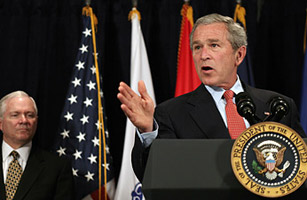
U.S. President George W. Bush speaks to reporters after a briefing with the Department of Defense in Washington, D.C..
"The President wants a blank check. The Congress is not going to give it to him."
—House Speaker Nancy Pelosi (D-CA) on President Bush's veto of the Iraq funding bill, which included a timeline for withdrawal
For only the second time in his presidency, George W. Bush exercises his veto power by rejecting legislation from Congress to impose an Oct. 1 deadline for withdrawing U.S. troops. A CNN poll later showed that 54% of Americans disapproved of the veto and just one week later, 144 Iraqi lawmakers sign a petition calling for a U.S. timetable for withdrawal. Hours before casting their votes on a spending bill for the war, 11 Republicans warn Bush that his stance on Iraq is threatening the GOP's future. The Washington Post calls it "a remarkably blunt White House meeting." At the end of the month, Bush cites America's continued post-war presence in South Korea as a model for the country's future in Iraq. The comparison coincides with the surge's completion, as the last of about 21,500 additional combat troops are sent to the region. White House spokesman Tony Snow quickly clarifies Bush's analogy, saying: "I think the point he's trying to make is that the situation in Iraq, and indeed, the larger war on terror, are things that are going to take a long time. But it is not always going to require an up-front combat presence."